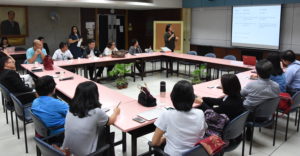 “Our competitiveness will start with our wellness.” This was one of the thoughts shared by Dr. Hernando Delizo of Healthcare Business Development, during the roundtable discussion held in UP ISSI last 16 August 2016. The focus was on the health and wellness industry, one of the clusters in the industry cluster project that UP ISSI is working on with Department of Trade and Industry National Capital Region Office (DTI-NCRO). The objective of the session was to gather information on the status of the health and wellness industry in NCR.
“Our competitiveness will start with our wellness.” This was one of the thoughts shared by Dr. Hernando Delizo of Healthcare Business Development, during the roundtable discussion held in UP ISSI last 16 August 2016. The focus was on the health and wellness industry, one of the clusters in the industry cluster project that UP ISSI is working on with Department of Trade and Industry National Capital Region Office (DTI-NCRO). The objective of the session was to gather information on the status of the health and wellness industry in NCR.
Director Emma Asusano of DTI-NCRO, along with other DTI staff, was also present during the event. Director Asusano gave a short overview of the purpose of the roundtable discussion in relation to the industry cluster project. Facilitated by Antonette L. Dungca, head of UP ISSI’s Research Division, the discussion zeroed in on the strengths, weaknesses, opportunities, threats and trends of the industry. The participants were a mixture of those connected with private firms, government agencies and an industry association.
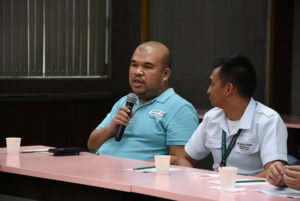
Vincent Ceducio of Organica Nutraceuticals remarked that their company had noticed a trend: that health and wellness is a really important consideration in the lives of most people and the company has focused on some of the needs of the growing call center industry, including health and wellness.
Meanwhile, Peping de Villa of GIGA Enterprises emphasized the need for micro, small and medium enterprises (MSMEs) to be informed of the services available to them. He also shared about the challenge of being able to produce the right product to match the trend.
Representatives from the Food and Drug Administration (FDA)—Directors Jesusa Joyce Cirunay, and Cynthia Rosuman as well as Ma. Theresa Cerbolles—talked about their plans of linking with the Negosyo Centers being established nationwide. (Negosyo Centers are one-stop business centers for would-be entrepreneurs who want to gain access to information and assistance in setting up their businesses.)
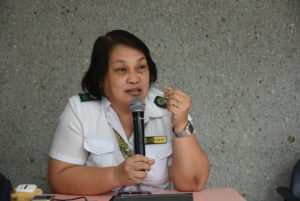
In relation to food supplements, the FDA officers remarked that their requirements for product registration have already been streamlined. They emphasized that all that is needed for the FDA to act on a case is for them to be informed about it and that the public may report the same in their website. They also gave the assurance that once a product has been registered with the FDA, the consumers have the protection of the Department of Health (the government agency to which FDA is attached) when it comes to the content and the process associated with the making of the product.
For the part of the Makati Health Department Dr. Corazon Salinas said they are planning for the establishment of a home care, but the priority of the local government now is to build drug rehabilitation centers, she said.
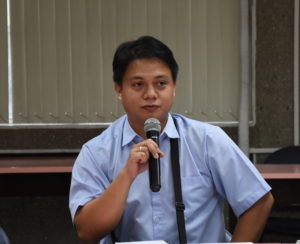
For Ron Cadarao of the Department of Agriculture (DA), businesses involved in organic and natural products are increasing. He said there was a trade fair exposition held in SM Megamall last year and it was attended by at least 80 exhibitor firms.
UP ISSI research head Antonette Dungca ended the roundtable discussion by expounding on one of the thrusts of the Institute (which is also shared by UP ISSI Officer-in-Charge Dr. Fidel R. Nemenzo): helping MSMEs, which is at the heart of the ISSI organization. MSMEs benefit not only individual entrepreneurs but also the whole country, because they generate employment and improve the economy.
Cacao and processed fruit industries in NCR
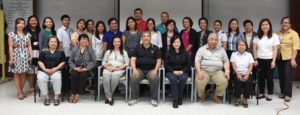 Another focus group discussion (FGD) was held last 25 August 2016, this time on the cacao (cocoa bean) and processed fruit industries. The second in the series of FGDs to be held in connection with the industry cluster project being implemented by UP ISSI with DTI-NCRO aimed to determine the current state of the cacao and processed fruit industries in NCR and to identify gaps in these sectors.
Another focus group discussion (FGD) was held last 25 August 2016, this time on the cacao (cocoa bean) and processed fruit industries. The second in the series of FGDs to be held in connection with the industry cluster project being implemented by UP ISSI with DTI-NCRO aimed to determine the current state of the cacao and processed fruit industries in NCR and to identify gaps in these sectors.
UP ISSI administrative officer, Prof. Rolando Ramon C. Diaz, speaking on behalf of Officer-in-Charge Dr. Nemenzo, welcomed the participants who came from concerned government agencies and from various private firms and associations representing the cacao and processed fruit industries.
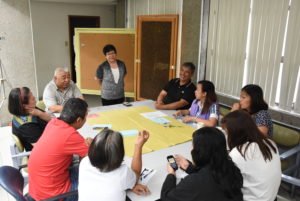
As in the first FGD, Director Asusano again explained the objectives of the project. Facilitated by Ivy Ganadillo of UP ISSI, the roundtable discussion zeroed in on the aspects such as profile, potentials, issues and support programs of the two industry clusters. The attendees, who were grouped together, were given sets of questions to answer during the breakout sessions. In the end, the ideas discussed were shared to the plenary.
One of the advantages of the two industry clusters, which was shared by Marlyn Salvador, one of the board members of the Philippine Calamansi Association, Inc., is the big demand for calamondin or local calamansi because of its uniqueness. It was however stressed that this competitive advantage is dependent on sourcing. There is not enough supply of the raw materials in terms of quality and low cost, the participants concluded. Securing licenses is also a concern. So is the expensiveness of testing products.
Likewise, cacao, specifically cocoa powder, is also in demand, as shared by Alex Luzano, general manager of Choco Locco. This ingredient is used in numerous products from baking products to makeup products, he said. The problem is also in sourcing, he added.
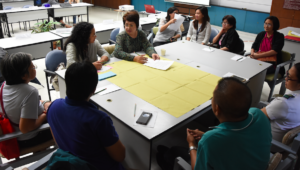 One of the suggestions to address the problem of supply for the cacao industry is the intercropping of cacao with coconut, as proposed by Edward David, president of Cocoa Foundation of the Philippines, Inc.
One of the suggestions to address the problem of supply for the cacao industry is the intercropping of cacao with coconut, as proposed by Edward David, president of Cocoa Foundation of the Philippines, Inc.
There was also mention, by the cacao and processed fruit groups, of existing support programs offered by various government agencies such as the Barangay Micro Business Enterprise, DTI’s SME Roving Academy, Negosyo Centers and International Food Exhibition Philippines, DA’s business matching, as well as technology interventions and facilities of the Department of Science and Technology (DOST).
Assistance is also given in terms of programs on good manufacturing practices or GMP, cleaner production and reduction of utility usage. Other agencies mentioned that also offer help to the industries were the Department of Environment and Natural Resources; DOST’s Philippine Council for Industry, Energy and Emerging Technology Research and Development; UP, particularly UP Los Baños, and FDA.
It was also emphasized that support programs for the cacao industry are designed to upgrade the agriculture industry and not the processing and manufacturing industries. The need to coordinate programs of various government agencies was also put forth to “harmonize everything about cacao”.
Ganadillo wrapped up the roundtable discussion by urging the participants to let UP ISSI know how else it can further help them.